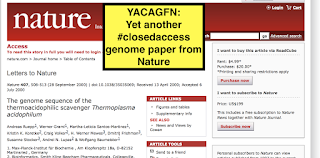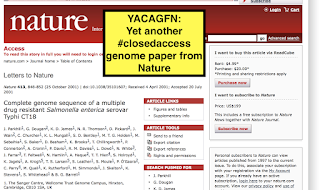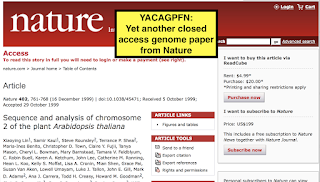So I searched for "Genome sequence" on the Nature site

And, well, I found a doozy of an example of a paper that is supposed to be openly available but is not. Initial sequencing and analysis of the human genome

That's right. The "public" human genome paper is not freely or openly available. It is $4.99 to rent or $20 to purchase. Is this Nature's way of saying "We think the Lander et al. paper did not actually report on a genome?" and that the Venter paper truly won the race? I don't think so. I think this is a way of Nature saying "How can we make money off of our past papers? Which one gets a lot of looks? What? It is freely available? Change that." or something like that.
Want to bet they will say this is a mistake? Want to bet they will not refund anybody's money who paid for this?
Here is a simple solution for everyone out there. Do not trust Nature Publishing Group to make something available even if they say they will.
UPDATE 9/25 1 PM
But wait - there is more. The Plasmodium genome paper, which I wrote about in 2012 not being available and which Nature promised to fix is again behind a pay wall






And more



UPDATE 10/16/17
Nature has apologized and said they fixed the issue and will refund any money people spent to buy these articles
— Nature Research (@nresearchnews) October 16, 2017
— Nature Research (@nresearchnews) October 16, 2017
 THE HUMAN GENE EDITING SUMMIT, CONT’D Citizens seeking to understand what was decided at last week’s Human Gene Editing Summit might be understandably confused by the contradictions in these headlines: Scientific community approves human gene
THE HUMAN GENE EDITING SUMMIT, CONT’D Citizens seeking to understand what was decided at last week’s Human Gene Editing Summit might be understandably confused by the contradictions in these headlines: Scientific community approves human gene